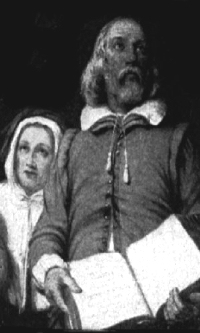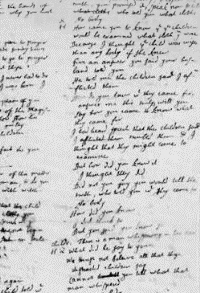

Record of Corey's Examination
In courts where ghosts appear as witnesses
And swear men's lives away. If I confess,
Then I confess a lie, to buy a life,
Which is not life, but only death in life.
-Henry Wadsworth Longfellow
Giles Corey was a prosperous, uneducated, eighty-year-old farmer and full member of the church. He and his wife Martha lived on a farm in the southwest corner of Salem village.
In March of 1692, Martha Corey made the mistake of publicly questioning the sincerity of the accusations of the afflicted girls. When the girls learned of her attacks, they quickly responded by accusing her of witchcraft. During an examination before John Hathorne, the girls claimed to see a yellow bird suckling between Martha Corey's fingers. They interrupted Hathorne's questioning with piercing screams and claims that Corey was biting, scratching, or strangling them. Ann Putnam told Hathorne that she had one
night seen Corey praying to the Devil outside the window of the Putnam home during a family dinner. Based on the girls' testimony, Martha Corey was sent to the Salem jail to await trial.
Giles Corey, certain of his Martha's innocence, spoke out against the girls who sent his wife to jail. Unsurprisingly, the girls countered with accusations of witchcraft against Giles in April 1692. Ann Putnam claimed that on April 13 the specter of Giles Corey visited her and asked her to write in the Devil's book. Later, Putnam was to claim that a ghost appeared before her to announce that it had been murdered by Corey. Other girls were to describe Corey as "a dreadful wizard" and recount stories of assaults by his specter.
Corey was examined by magistrates on April 18, then left to languish with his wife in prison for five months awaiting trial. When Corey's case finally went before the grand jury in September, nearly a dozen witnesses came forward with damning evidence such as testimony by Elizabeth and Alice Booth that Corey served bread and wine at a sacrament attended by over fifty witches. Both Ann Putnam and Mercy Lewis described Corey as "a dreadful wizard." Corey knew he faced conviction and execution, so he chose to refuse to stand for trial. By avoiding conviction, it became more likely that his farm, which Corey recently deeded to his two sons-in-law, would not become property of the state upon his death.
The penalty for refusing to stand for trial was death by pressing under heavy stones. It was a punishment never before seen--or ever again inflicted--in the colony of Massachusetts. On Monday, September 19, Corey was stripped naked, a board placed upon his chest, and then--while his neighbors watched--heavy stones and rocks were piled on the board. Corey pleaded to have more weight added, so that his death might come quickly.
Samuel Sewall reported Corey's death: "About noon, at Salem, Giles Corey was press'd to death for standing mute." Robert Calef, in his report of the event, added a gruesome detail: Giles's "tongue being prest out of his mouth, the Sheriff with his cane forced it in again, when he was dying." Judge Jonathan Corwin ordered Corey buried in an unmarked grave on Gallows Hill.
Corey is often seen as a martyr who "gave back fortitude and courage ratherthan spite and bewilderment." His very public death played a role in building public opposition to the witchcraft trials.
THE MAN OF IRON
Giles Corey was a wizard strong, a stubborn wretch was he;
And fit was he to hang on high upon the locust tree.
So, when before the Magistrates for trial he did come,
He would no true confession make, but was completely dumb.
"Giles Corey," said the Magistrate, "What hast thou here to plead
To those who now accuse thy sould of crime and horrid deed?"
Giles Corey he said not a word, no single word spoke he.
"Giles Corey," said the Magistrate, "We'll press it out of thee."
They got them then a heavy beam, then laid it on his breast;
They loaded it with heavy stones, and hard upon him pressed.
"More weight," now said this wretched man. "More weight!" again he cried;
And he did no confession make, but wickedly he died.
--Anonymous (early 18th century)
